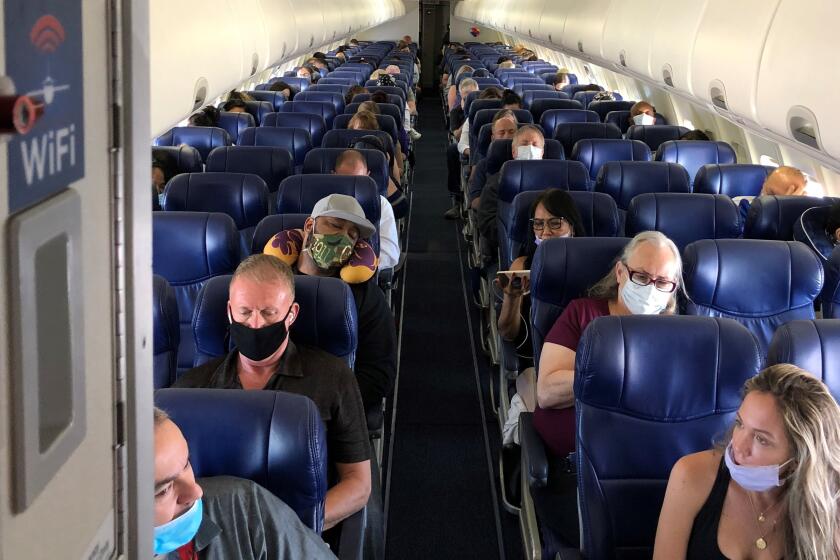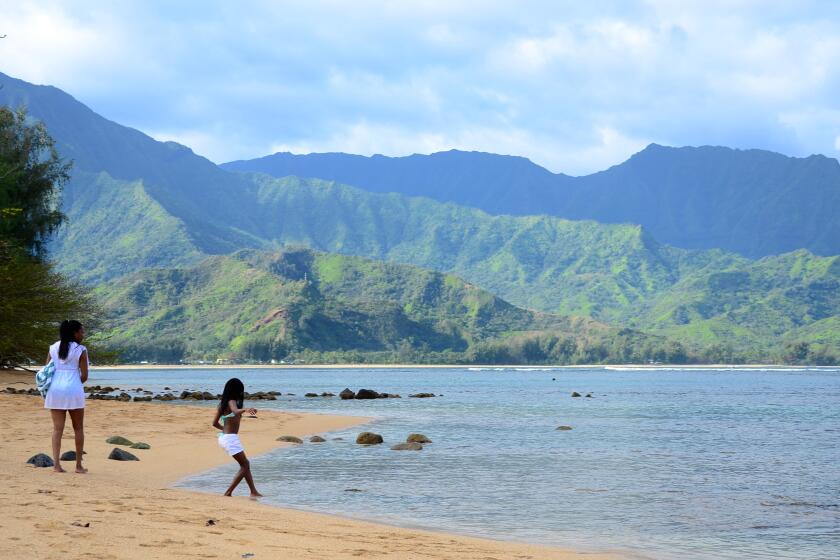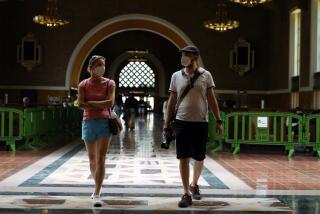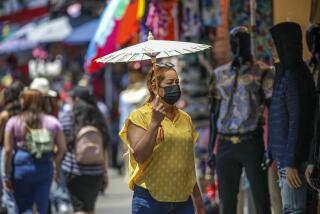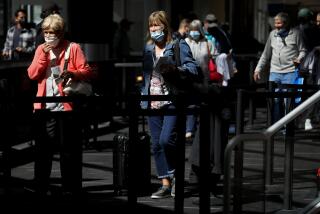Don’t want to wear a mask on the plane? Too bad. Airlines now will require it
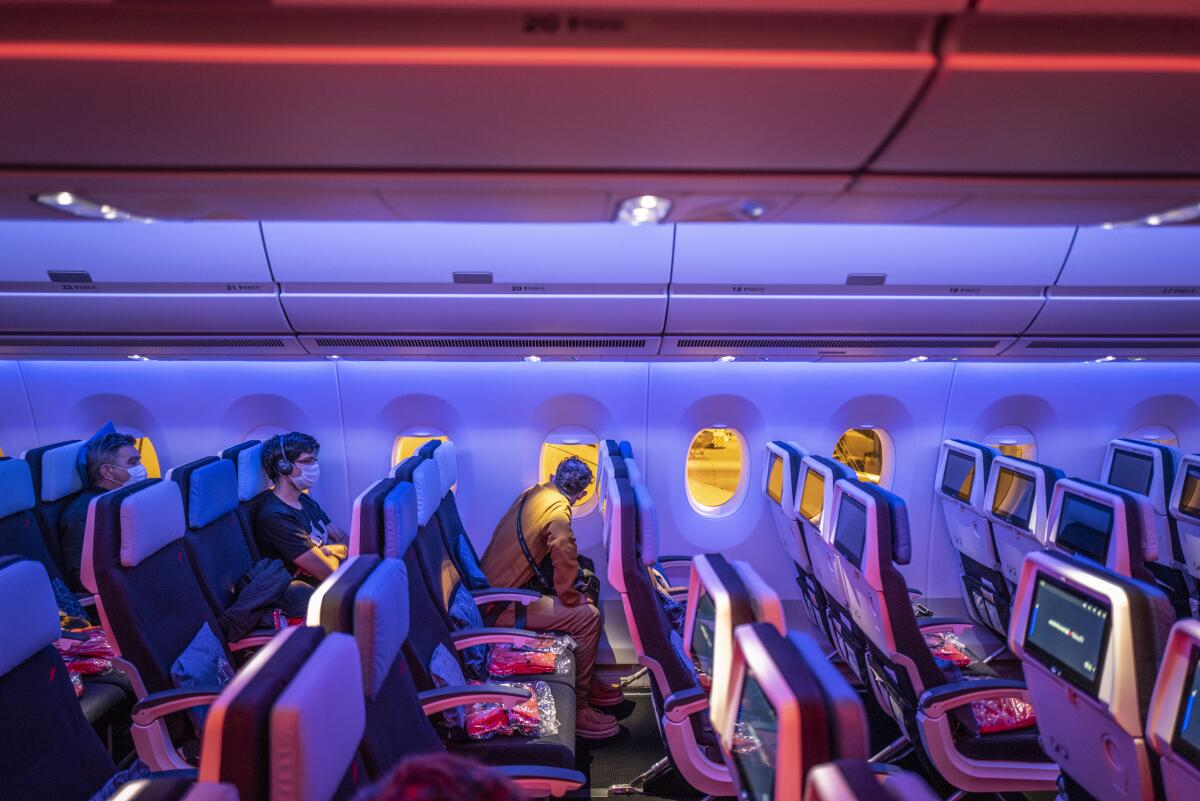
- Share via
Question: Do I have to wear a mask when I fly?
Answer: Yes, unless you’re going by broomstick or private plane, options that are available only to a select few of us.
We’ve all read and heard objections to wearing face coverings as a deterrent to spreading the coronavirus, so I checked with legal experts, doctors and even a former chief executive of several airlines to get their take on the mask objections. Here are some of their responses.
Objection: I never agreed to wear a mask.
Besides agreeing to comply with an airline’s rules, spelled out in its contract of carriage (which you agree to when you buy a ticket), carriers are or will be getting you to attest that you will wear a mask.
United and Alaska already require fliers to complete a health assessment, in which passengers affirm they feel fine, haven’t been around people who are ill and, oh, by the way, agree to wear a face covering.
Nevada is the latest state to require people to wear face coverings in public indoor places to stop the spread of the novel coronavirus.
All major U.S. carriers will implement the health assessment, Airlines for America, an industry trade group, announced Monday. The acknowledgment asks passengers to “bring a face covering and wear it at the airport, on the jet bridge and onboard the aircraft,” A4A said.
Objection: There’s no federal regulation mandating masks.
True. But that doesn’t mean you can ignore the airlines’ mandates.
“Airlines are private businesses and airlines have a right to have rules of their own about what you can and cannot do on their premises,” said Sharona Hoffman, a professor and public health law expert at Case Western Reserve University in Cleveland. Just as restaurants can say “no shirt, no shoes, no service,” airlines can say you must comply, she said.
Objection: Airlines aren’t in the healthcare business so they shouldn’t be able to tell me what precautions to take.
Also true. But “they have all kinds of rules that impact people’s health,” Hoffman said. They tell you to wear a seat belt and put your tray table and seat back up or to sit down during turbulence.
“It’s about trying to keep people as safe and as healthy as possible,” she said.
Objection: But travel is a right, and I should get to determine the mask issue.
No, it’s not, and no you shouldn’t.
Kay Van Wey, a partner at Van Wey, Presby & Williams Trial Law Firm in Dallas, likened the right to travel to the right to get a haircut. “There is no constitutional right to get a haircut, and there is no constitutional right to fly,” she said.
“I went to get my haircut the other day, and they took my temperature. I had to answer a questionnaire and wear a mask. If I had refused, they would have said, ‘So sorry. There’s no constitutional right to a haircut. We are a private business.’
“If I had gotten in there and taken off my mask, they could have called the police. It’s the same with the airlines.”
Air travel now is a matter of far fewer people, more masks, more disinfectant, less food and drink; and, unless you’re a nosy reporter, a lot less conversation.
Objection: I won’t be exposed because airlines are blocking middle seats.
Some airlines, such as Southwest, Delta and JetBlue, have consistently blocked middle seats. But United and, more recently, American have said they cannot promise the empty seat.
Doing so is not economically sustainable, said David Banmiller, formerly chief executive of Aloha, Sun Country and Pan American airlines and the author of the recently released book “Turbulence: Fifty Years on the Leading Edge of the Airline Industry.“
“Keep the middle seat open, then a third of the revenue goes away,” Banmiller said. “Cash is going to fly out the windows. The math is not that complicated.” Middle seats can remain open only if passengers are willing to pay more for tickets, he added.
But even an empty middle seat in most economy-class configurations doesn’t give you the suggested six-foot distancing; your seat is generally 17 to 19 inches wide. Armrests take up some space, but even if you’re bad at math, you know that you can reach across an empty middle seat and touch the other passenger. That is not six feet.
“Any time you’re in a close setting and now that we have a pandemic going on, it’s highly recommended you wear a mask,” said Dr. Nikhil Bhayani, an infectious disease specialist with Texas Health Resources. “You want to protect yourself and others, especially since we know you don’t have to have the symptoms to spread coronavirus.”
Objection: Masks don’t prevent anything.
The Centers for Disease Control and Prevention begs to differ. And the World Health Organization says: “The use of masks is part of a comprehensive package of the prevention and control measures that can limit the spread of certain respiratory viral diseases, including COVID-19.”
At the very least, a face covering prevents you from spitting on one another.
Part of the ugly truth of in-person communication is that people often spray when they speak, said Dr. Donna Casey, an internist at Texas Health Presbyterian Hospital Dallas, who is also completing her master’s in public health at Harvard.
That’s particularly dangerous with the coronavirus.
You must be sure you’re wearing your mask correctly — nose and mouth covered — and that the fabric is appropriate. If you look through your mask and it’s like staring through a burlap bag, that fabric isn’t going to work, Casey said. Material with at least 600 threads per inch, including silks and heavy cottons, is preferred.
Objection: Masks are confining, uncomfortable and can affect my health.
Surgeons, Casey noted, often wear masks for 12 to 14 hours at a time. Those who are not used to wearing a mask may feel “funny because of being constricted around your face,” Casey said, but that’s “more of an emotional feeling.”
If your mask were obstructing your breathing, you’d pass out from lack of oxygen, she said. Some anti-maskers say that breathing in your own carbon dioxide can harm you. Casey said there is “absolutely no data on that. Zero.” (Don’t confuse CO2 with carbon monoxide, which is harmful and found in vehicle emissions as well as cigarette smoke.)
If your mask isn’t comfortable, find one that is, Bhayani added. At first, masks were in short supply. Not anymore. And they can even be a fashion statement too.
Objection: It’s not fair to make me wear a mask.
Since the beginning of the pandemic, feel-good advertising keeps trying to tell us we’re all in this together.
We’re not.
If we were, Black and Latino residents of Los Angeles County wouldn’t be dying at disproportionately high numbers, Rong-Gong Lin II reported in the L.A. Times.
But if there is one situation in which everyone is in the same boat, it’s in an airplane. Wearing a mask gives everyone a fighting chance. What’s unfair about a level playing field?
Pre-tested travelers will be able to skip 14-day confinement if they have proof of a negative COVID test starting Sept. 1.
One man who refused to wear a face covering on an American Airlines flight, even after crew members asked him to, was removed and banned from flying “until the airline drops its requirement that passengers and crew members wear face coverings,” Time reported.
As with most things related to flying, airlines hold most of the cards.
Have a travel problem, dilemma or concern? Write to [email protected]. We regret we cannot respond to every inquiry.
More to Read
Sign up for The Wild
We’ll help you find the best places to hike, bike and run, as well as the perfect silent spots for meditation and yoga.
You may occasionally receive promotional content from the Los Angeles Times.
